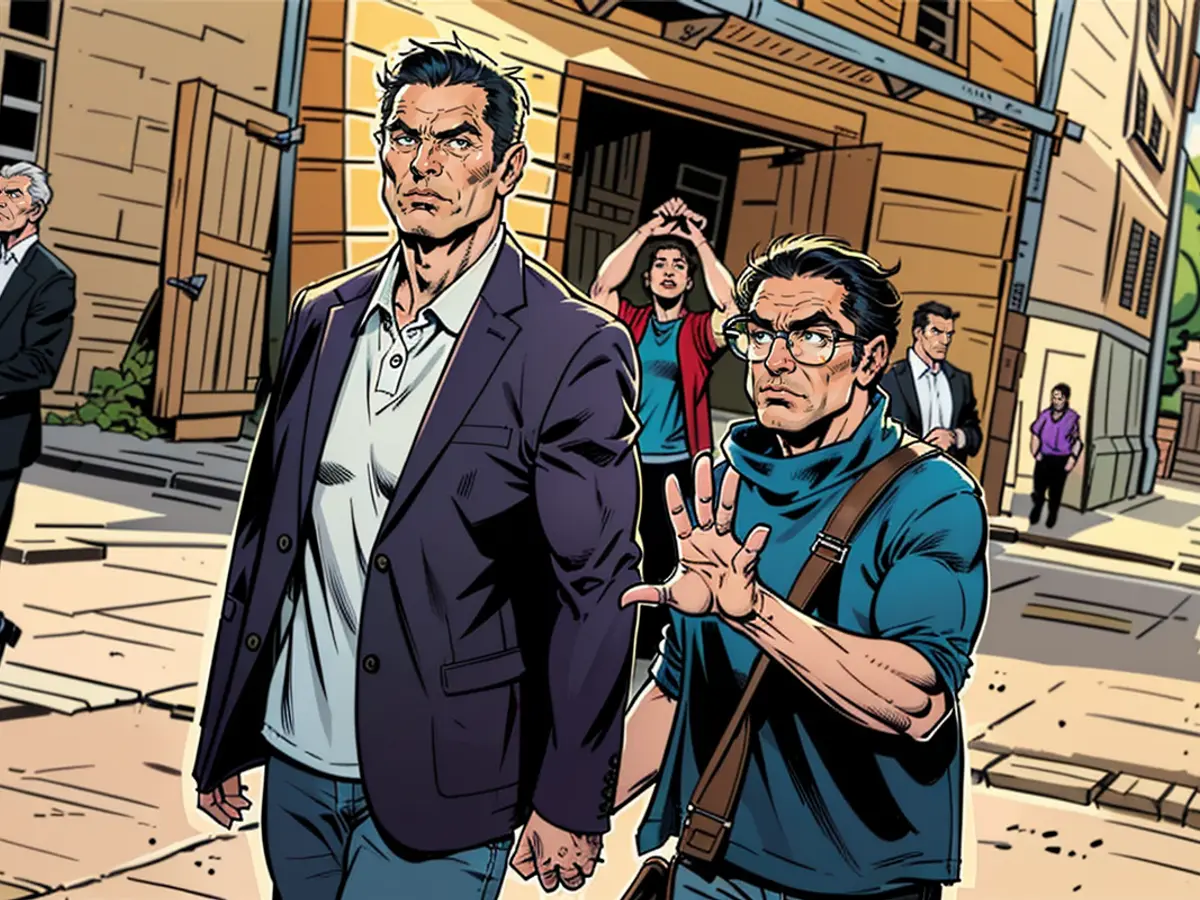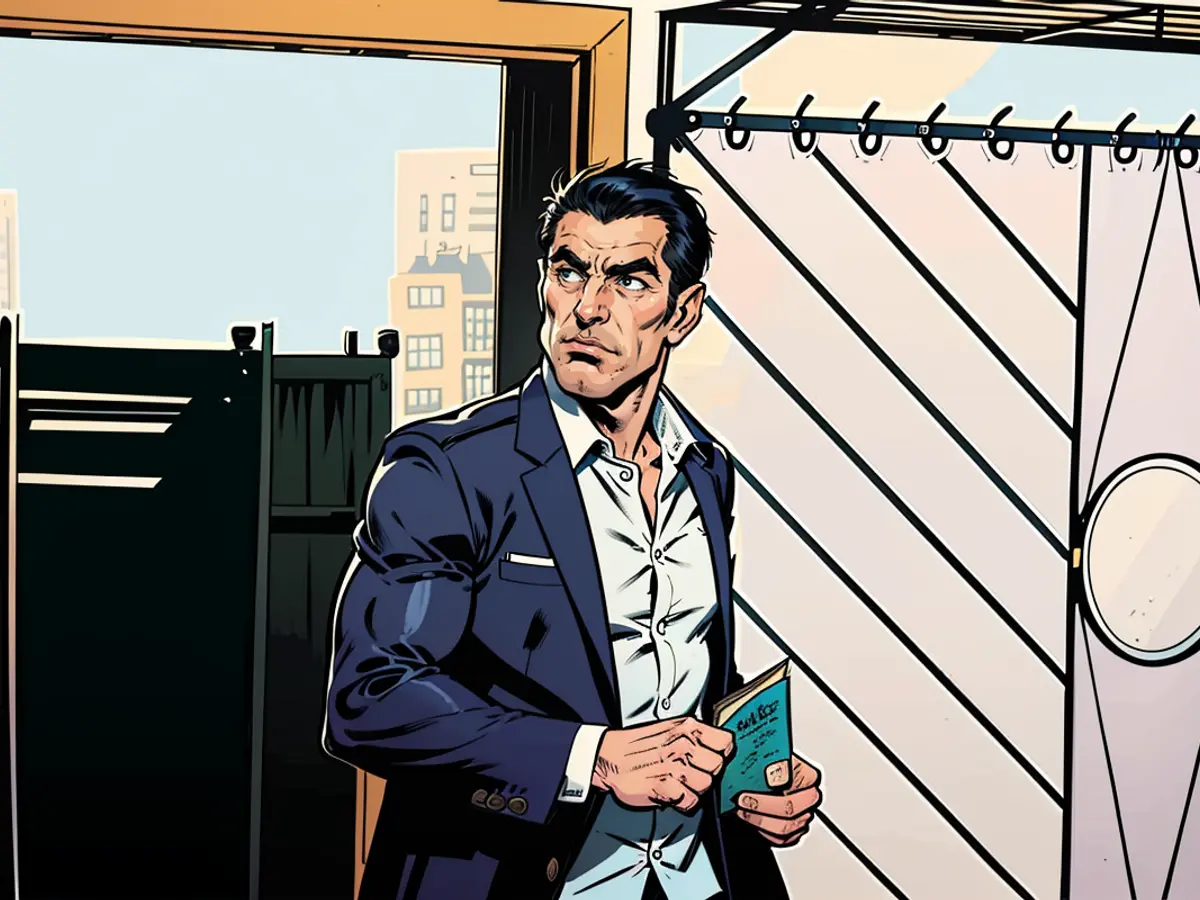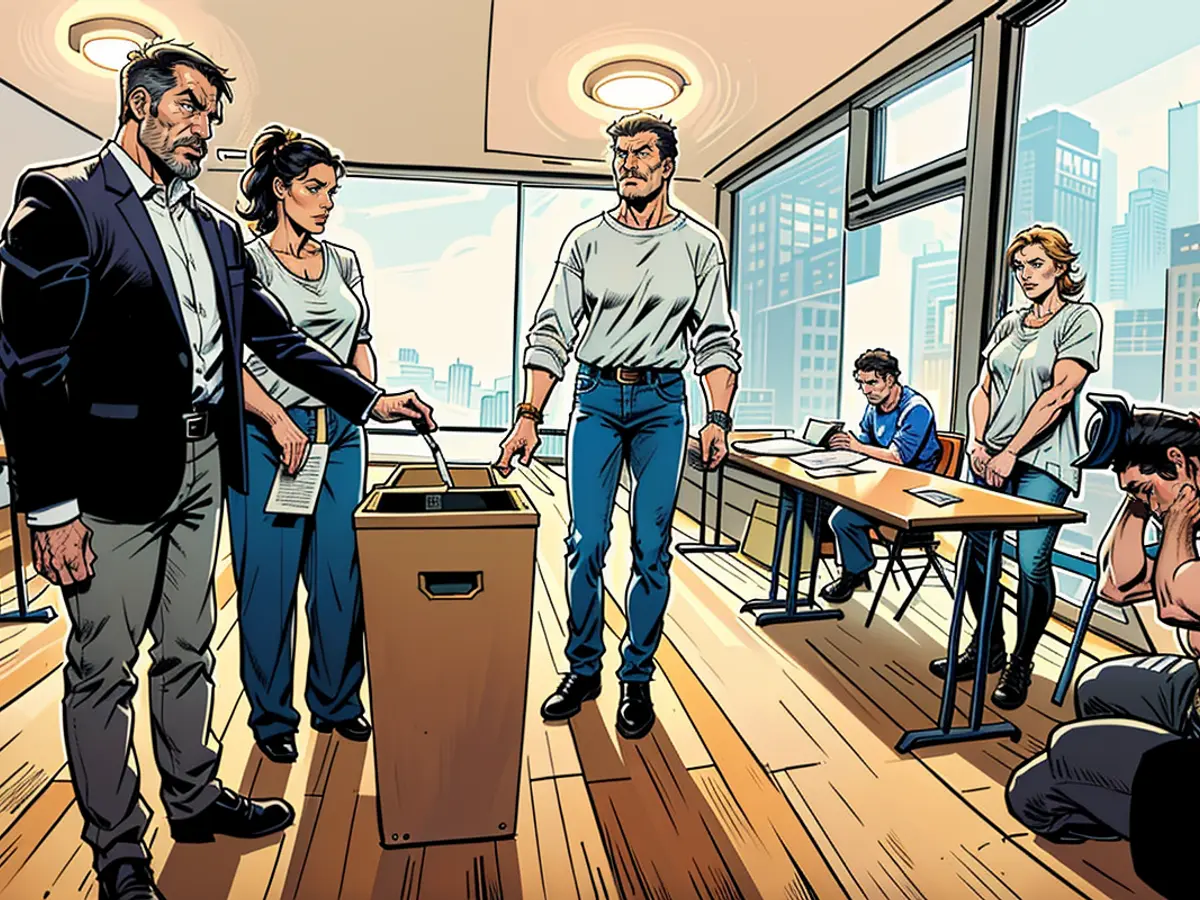At 05:45, political groups deliberate on election outcomes in Saxony and Thuringia
Morning Meeting About State Elections: Saxony and Thuringia The higher-ups in federal committees are conferencing early morning regarding the state election outcomes in Saxony and Thuringia. Later in Berlin, political leaders will engage with the public starting from early morning. The SPD, AfD, and BSW led by Sahra Wagenknecht will initiate the discussions at 11:00 AM, followed by the FDP at 11:30 AM, CDU at 1:00 PM, and Greens at 2:00 PM. The traffic light coalition's parties have endured setbacks in both states. The FDP is no longer present in either parliament, and the Greens have been ousted from Thuringia's state parliament. AfD prevailed with a substantial lead over CDU in Thuringia, while CDU emerged victorious in Saxony by a slim margin. The BSW garnered notable scores in both states right from the get-go.
05:08 Scholz Commends SPD's Campaign: "Prophesied Gloom Did Not Materialize" Olaf Scholz, the German Chancellor, described the state election results as "grievous" and urged Saxony and Thuringia's parties to form coalitions without AfD. He demanded that all democratic parties must now join forces to establish stable governments, excluding right-wing extremists. "AfD is causing damage to Germany," Scholz stated, "By weakening the economy, exacerbating societal divisions, and tarnishing our country's reputation." He also lauded the cohesion of the SPD, acknowledging that dreadful predictions regarding its electoral performance did not transpire.
04:44 Lembcke Suggests CDU's Potential Shift to the Left Given the tumultuous political environment in Thuringia, political scientist Olvier Lembcke from the Ruhr University Bochum advocated that CDU should reconsider its stance towards the Left party. This would incite a debate revolving around CDU's traditional 'firewall' policy towards the AfD, he claimed. "If you ponder one firewall, you will have to analyze the other one as well."
03:31 Urban and Kretschmer Secure Direct Mandates in Saxony Jörg Urban, the AfD's top candidate in Saxony, bagged a direct mandate in the state election. He garnered 42.4% of the first votes, outdoing CDU candidate Marko Schiemann with 38.1% in the Bautzen 5 constituency. Even though CDU clinched a narrow win in the Saxony election ahead of AfD, Michael Kretschmer maintained his direct mandate in the Görlitz 2 constituency with 47.2% votes.
02:18 Esken Regrets Solingen Statement, Stresses Importance of Taking Islamist Threat Seriously SPD chairwoman Saskia Esken admitted that her statement about learning little from the suspected Islamist attack in Solingen was unfortunate and incorrect. "That was not smart or a correct statement," she communicated on election night, to Welt TV. "We need to take Islamism and the possible Islamic terror threat more seriously than we've been doing so far", she added, referring to the federal government's measures against Islamism.
01:34 Support for Merz as Chancellor Candidate within Union Grows Following the Saxony and Thuringia elections, speculation about the chancellor candidacy for the upcoming federal election resurfaced within the Union. Günther Oettinger, former Baden-Württemberg Minister President and EU Commissioner, is supporting Friedrich Merz and urging for an immediate decision. "It would be a misstep if the nomination does not occur at the absolute earliest after the election in Brandenburg," he mentioned, as the Brandenburg election takes place in three weeks. "I see broad backing for Friedrich Merz to be given the opportunity," Oettinger asserted, while echoing similar sentiments from Thorsten Frei, Union's parliamentary business manager in Bundestag, and Horst Seehofer, ex-Interior Minister and CSU politician.
01:01 Grimma Mayor Wins Seat for Free Voters in Saxony Grimma's mayor, Matthias Berger, secured a place in Saxony's state parliament for the Free Voters during the state election. He clinched the direct mandate in Leipzig 3 constituency, as per the election commission's night-time data. Berger bagged 36.6% of the votes, making him the flagbearer for the Free Voters in Saxony. On a state-wide level, however, the party garnered only 2.3% of the second votes.
00:29 Political analyst ponders minority government in SaxonyLeipzig political analyst Hendrik Traeger is contemplating a minority government in Saxony composed of CDU and SPD, with the aid of Alliance 90/The Greens. According to Traeger, all Alliance 90/The Greens need to do is abstain in votes, allowing CDU and SPD to govern with a relative majority. These arrangements are prevalent in Scandinavian nations, making it a viable option, suggests Traeger.
00:09 Government formation talks in Erfurt: Ramelow offers Voigt supportThuringia's Minister President, Bodo Ramelow, has agreed to support CDU's state chairman Mario Voigt in assembling a functional government in the Erfurt state parliament. Ramelow, a Left Party politician, says he wishes to back the individual with a mandate from the voters to establish a majority government within the democratic spectrum, in this case, Voigt. He is not opposed to Alliance 90/The Greens or the CDU, but instead, he combats the "normalization of fascism." He aims to prevent a Parliamentary situation by the AfD, in which they manipulate all other parties.

23:29 Hocke secures seat in Thuringian Parliament despite defeatAfD's direct candidates secured victories in 29 out of 44 constituencies. However, Björn Hocke failed to secure a seat in the Greiz II constituency, losing to the CDU's Christian Tischner. Nevertheless, with an impressive 32.8% vote share, the AfD is poised to secure more seats in the state parliament than their direct candidates. Because of this, Hocke, who leads the state list, is ensured a seat in the state parliament.
23:13 Preliminary results: CDU may consider Left, Green, and FDP partnershipsIn Thuringia, the AfD has garnered the highest vote share in a state election for the first time in Germany, with a 32.8% increase. However, they will not be able to realize their desire for government, as no democratic party is willing to form a coalition with them. As the second-strongest force, the CDU will likely need to reach out to the Left for a stable government coalition. Sadly, they do not have enough seats for a majority with the SPD and BSW.
23:03 Left Party secures direct mandates in Saxony, CDU coalition loses majorityThe Left Party has secured two direct mandates in Leipzig, permitting the party to enter the parliament despite not surpassing the 5% threshold according to projections. This means that the previous Kenya coalition of CDU, Greens, and SPD no longer holds a majority.
22:54 Green Party leader: Migration and Ukraine critical election factorsGreen Party leader Omid Nouripour attributes the outcomes of the state elections in Saxony and Thuringia to migration and Ukraine matters. "It is evident that migration and the urgency to guarantee peace in Ukraine influenced the results significantly," Nouripour said in an interview with the Phoenix broadcaster. While the federal government is addressing these issues, they are suffering due to the coalition's destructive infighting, says Nouripour.
22:39 Thuringia: CDU, BSW, and SPD currently lack majorityThe red-red-green government under Prime Minister Ramelow has reached its end in Thuringia. Since no party is willing to form a coalition with the AfD, a coalition of CDU, BSW, and SPD is the most likely alternative. However, according to current projections (as of 22:15), this arrangement may still be short of one seat for a majority in the state parliament. In which case, the Left would be essential for such an alliance.
22:24 Top CDU candidate Voigt fails to secure direct mandate in ThuringiaCDU's top candidate Mario Voigt missed the direct mandate in his constituency during the Thuringian state election. Voigt received 37.4% of the first votes in the Saale-Holzland district II, trailing AfD's Wiebke Muhsal, who won 39.2% of the votes. In the 2019 state election, Voigt still managed to enter the state parliament as a direct candidate.
22:07 Many young voters vote for AfD in ThuringiaMore than a third of young voters in Thuringia cast their ballots for the AfD, a classified right-wing extremist party by the domestic intelligence agency. This is according to an infratest-dimap survey for ARD, which reveals that 38% of 18-24 year-olds in Thuringia voted for the AfD. CDU was a close second with 13%, while the Greens fared the worst among young voters with only 6% of the votes.
21:39 Kretschmer Secures Direct Seat in Saxony with Slim marginMichael Kretschmer, Saxony's Minister-President, has secured a direct seat in his constituency of Görlitz II with a narrow margin. With 47.2 percent of the votes, Kretschmer just squeaked past the AfD candidate, who received 39.4 percent. Kretschmer's party underperformed in his constituency, managing only 34.2 percent of the votes, while the AfD outperformed, securing 37.3 percent.

21:32 Early Returns Favor CDU in SaxonyPreliminary results from ARD and ZDF show the CDU leading in Saxony, with a slender advantage of about 0.1 percentage points. According to Infratest Dimap (ARD) and Forschungsgruppe Wahlen (ZDF), the CDU is at 31.5 to 31.8 percent, while the AfD trails behind at 30.4 to 30.8 percent. Initially, the Forschungsgruppe Wahlen had predicted a close race between the CDU and AfD, with the AfD gaining momentum. However, ARD's preliminary results consistently put the CDU in a commanding position.
21:21 Thuringia Elections: Ramelow's Ambitions Fall ShortThe Left Party has suffered significant losses in the Thuringia state elections, making it unlikely that Minister-President Bodo Ramelow will retain his position. One of Ramelow's ambitious goals for the night - to prevent the AfD from securing a third of all votes - seems unlikely to materialize. With the AfD appearing to have achieved this, a two-thirds majority for decisive votes becomes a distant dream.
21:13 SPD Struggles in Thuringia and Saxony, Klingbeil Defends ScholzFederal Chancellor Olaf Scholz has the unwavering support of his party, the SPD, despite disappointing results in the Thuringia and Saxony state elections, according to SPD leader Lars Klingbeil. In an interview with ZDF, Klingbeil urged everyone to redouble their efforts to regain voter trust. "We all have a role to play in turning things around."
21:02 Kubicki: 'Traffic Light Coalition Has Lost its Legitimacy'FDP deputy chairman Wolfgang Kubicki has called for consequences following the poor performance of the 'traffic light' parties in the Saxony and Thuringia elections. "The election results make it clear: The traffic light coalition has lost its legitimacy," Kubicki wrote on 'X'. If a significant portion of voters reject the coalition in this manner, it can't go unpunished. The public perception is that "this coalition is doing more harm than good." The FDP failed to surpass the 5 percent threshold in both state elections and is now polling at just 1 percent.
20:41 Höcke Fails to Secure Direct Seat in ThuringiaIn the district of Greiz II, where AfD faction leader Björn Höcke is running, preliminary results show that Höcke has missed the magic number to enter the Thuringian state parliament directly. According to ntv information, the party will secure Höcke's seat in the state parliament through another means.
20:37 Left Party May Stillmake it to Saxony Parliament despite 4-Percent DropDespite significant losses, the Left Party in Saxony looks set to secure a place in the state parliament. Although it fails to clear the 5 percent hurdle with second votes and is projected to reach 4.3 percent by ZDF, two Left Party direct candidates in Leipzig constituencies lead comfortably. If these candidates secure more votes than their competitors and finish in the top two, the Left Party could expect a few seats in the new state parliament.
20:28 Projection for Thuringia: AfD Gains GroundIn the ZDF projection for the Thuringia election results, the AfD's lead continues to grow. The party is predicted to secure 33.4 percent of the votes, while the CDU trails behind at 23.8 percent. The SWB is projected to receive 15.5 percent, the Left Party 11.9 percent, the SPD 6.0 percent, and the Greens 3.4 percent. The FDP is expected to fall short of the 5 percent threshold.
20:17 Projection for Saxony: CDU and AfD in a Dead HeatBased on the current ZDF projection, the CDU and the AfD in Saxony are neck and neck, with the CDU gaining a marginal lead of 0.1 percentage points. According to this, the Christian Democrats are projected to receive 31.5 percent, while the AfD, designated as a right-wing extremist organization by the constitutional protection agency, is projected to receive 31.4 percent. In Thuringia, the AfD is pulling away from the CDU, according to the projections. The Greens are projected to be in danger of losing their parliamentary seats, with just 5.1 percent in the polls. The Left Party faces an uphill battle with a projected 4.3 percent. The SPD is comfortably secured with 7.6 percent.

19:56 Thuringia: Höcke's Direct Seat May Be JeopardizedBjörn Höcke, the leader of the AfD's Thuringia faction, is facing a potential threat to directly securing a seat in the Thuringian state parliament. With 68 out of 74 constituencies counted, Christian Tischner from the CDU leads, boasting 42.3% of the votes, while Höcke follows closely behind with 40.4%. If Tischner collects a majority of votes in the Greiz II constituency, Höcke could miss out on a direct entry into parliament, necessitating his reliance on a seat through the state list, which he tops. However, if several AfD candidates are successful as direct candidates, no one could enter parliament via the state list.
19:50 Höcke on AfD's Triumph: "That 'Wall' Approach Has Failed"In Thuringia, the AfD is storming the state parliament as the dominant force, according to Höcke, the AfD lead candidate. In an interview with ntv, he labels the election result as "historic" and talks about the upcoming government formation.
19:42 Ramelow on Left's 'Devouring': "CDU's Constant Equation of AfD and Left Led to Exclusionism"Thuringia's Minister President Bodo Ramelow believes two factors are responsible for what he calls the "cannibalization" of the Left Party: "Firstly, a CDU that has been persistently equating the AfD and the Left, pushing 'exclusionism' towards us, despite sharing power with us in the region for five years," Ramelow explains to ntv. He attributes the second cause to the BSW winning 17% of votes for the AfD in their forecast, yet actually taking away support from the Left. Despite this, Ramelow could still celebrate high voter turnout.
19:26 Nouripour on AfD's Victorious Streak: "Those Fearful Need My Support"With the AfD securing over 30% in both Saxony and Thuringia's state elections, the coalition parties lag far behind. Green Party leader Omid Nouripour sees the AfD's election result as a "critical juncture" and a call to defend democracy together.
19:13 Updated Prediction for Saxony: CDU's Win Margin NarrowsThe latest ZDF projection reveals the AfD narrowing the CDU's lead: The Christian Democrats currently lead with 31.7%, barely ahead of the AfD with 31.4% of the votes. The BSW registers 11.4%, the SPD 7.8%, while the Greens will feel more secure in the state parliament with 5.5%. The Left falls below the 5% threshold with 4.3%.
19:08 Wagenknecht on Thuringia: "We Desire a Stable Majority Government with the CDU and SPD"BSW leader Sahra Wagenknecht is aiming for a coalition with the CDU and potentially also the SPD in Thuringia. "We hope to achieve a good co-government with the CDU - probably also with the SPD," said Wagenknecht on ARD. After five years of minority government, people yearn for a stable majority government that tackles pressing issues like "significant teacher shortages" in Thuringia. Concurrently, they aspire for a state government that voices its concerns in federal politics, representing peace, diplomacy, and opposition to US missile stationing in Germany. Wagenknecht dismissed any potential coalitions with the AfD in Thuringia.
19:02 Updated Prediction for Thuringia: AfD's Success StrengthensProjections indicate unfavorable news for the Left Party in Thuringia, as the AfD overperforms initial estimates. According to current projections, the right-wing extremists are expected to capture 33.1% of the votes in the state. The CDU stands at 24.3%, Wagenknecht's alliance at 15%, and the Left, currently holding the popular Minister President Bodo Ramelow, faces a near-8% decrease, earning 11.7%. The SPD remains at 6.6%, and the Greens register 4%.
18:56 Goring-Eckardt on Thuringia: "AfD's Triumph a Democratic 'Surprise' in Germany"Green Party politicians in Germany are left shocked by the AfD's victory in Thuringia, an even more significant blow than the party's defeat in the state elections. Green Bundestag Vice President Katrin Goring-Eckardt labels the right-wing extremists' success as a "surprise" for Germany. Party leader Omid Nouripour expresses his regret over the party's failure as "marginal" when compared to the AfD becoming the strongest force in a state parliament.

18:48 Kretschmer on Saxony: "Our Rock in Coalition"**Saxony Minister President Michael Kretschmer celebrates the CDU's stability as the backbone of the government coalition. "We have every reason to celebrate," said Kretschmer at his party's election party. "We have been through five challenging years," and the people of Saxony have chosen to trust the CDU rather than orchestrating a vote of protest. "We are acutely aware of the people's dissatisfaction with the situation in Berlin."
18:39 Preliminary Results for Saxony: CDU's Edge over AfD DiminishesBased on initial figures reported by ZDF, the CDU's advantage over the AfD in the Saxony state election has become smaller: the CDU now has a slight lead with 31.9%, compared to the AfD's 31.3% of the votes cast. The BSW stands at 11.6%, followed by the SPD at 7.8%. The Greens would just manage to enter the state parliament with 5.2%, while the Left would fail to do so with 4.5%.
18:33 AfD Chair Weidel Claims Coalition for AfD in Thuringia and SaxonyAfD's federal party chairperson Alice Weidel asserts that her party should be part of the government in Thuringia and Saxony. "Under regular circumstances, as is customary in this country, the strongest party—which is the AfD—would be exploring options," says Weidel on ARD, referring to Thuringia. "The electorate wants the AfD to be included in the government. We attract 30% of the voters in both federal states, and without us, a stable government is not possible."
18:30 SPD Sec-Gen: "Loser's Night" for SPD in Thuringia and SaxonySPD's Secretary-General Kevin Kuhnert acknowledges his party's underwhelming results in the Thuringia and Saxony elections. "It's not a night to celebrate for the SPD," he said on ARD. Despite the party's struggles in recent years, Kuhnert says, "There was a real risk of being eliminated from the state parliaments." "Fighting is worth it, we're needed," Kuhnert added, mentioning the need for more explanation and engagement with voters. When asked about Scholz, he said, "We need to explain our policies together."
18:23 Höcke Hails Thuringia Result as "Historic Success"AfD faction leader Björn Höcke sees the Thuringia result as "historic." According to Höcke, reported by MDR, "The AfD is the number one people's party in the federal state. The silly firewall nonsense has to stop." Höcke believes that change will only come with the AfD's involvement.
18:21 Chrupalla on Thuringia: "Virtual Tie with CDU"AfD party leader Tino Chrupalla applauds his party's success, saying that "a shift in politics in both federal states" has occurred, stating this in ZDF. Chrupalla states that the AfD is now open to negotiations with all parties. "In Saxony, we're neck and neck with the CDU," he said, emphasizing that the AfD wants to govern for the betterment of Saxony.
18:17 CDU General Secretary: No Coalition with AfDCDU's General Secretary Carsten Linnemann has ruled out collaborating with the AfD in Thuringia or Saxony. "We're decisive on this issue," Linnemann said in ARD. The CDU will form governments from the center of the parliament, expressing confidence in their ability to succeed. Linnemann proclaimed that the CDU, being the last remaining people's party, is the "bulwark," noting that the traffic light parties have faced consequences.
18:13 Projection for Saxony: CDU Slimly Ahead of AfD, BSW at 12%, Greens Hanging onThe initial projection for the Saxony state election shows the CDU leading with 31.5%, narrowly ahead of the AfD at 30%. The BSW ranks third with 12%, while the SPD will continue to be represented in the state parliament with 8.5%. The Greens are barely holding on with 5.5%. The Left would not be represented in the new parliament, according to the projection, while the FDP would not be in the state parliament.

18:10 Projection for Thuringia: AfD Ahead of CDU, BSW Gains 16%The initial projection for the Thuringia state election indicates a clear advantage for the AfD with 30.5%, followed by the CDU with 24.5%. The Left has gained 12.5%, and the SPD maintains a seat in the state parliament with 7%. The BSW secures a spot in the state parliament with 16%, while the Greens and FDP fail to surpass 5%.
17:18 Björn Höcke's Seat in Future Thuringia Parliament UncertainLeader of the AfD faction in Thuringia, Björn Höcke, may not secure a spot in the upcoming state parliament. His fellow party members in constituencies have a good chance of winning direct mandates, potentially hindering Höcke's prospects. He faces stiff competition from CDU candidate Christian Tischner in the Greiz II constituency. If Tischner emerges victorious and the AfD obtains more direct mandates than allocated based on the second vote results, no one can enter the state parliament through the state list, not even from the first place, which is Höcke's current position. In such a scenario, the AfD might persuade a successful direct candidate to relinquish their state parliament seat, ensuring Höcke maintains his mandate.
16:48 Media Exclusion Possible at AfD Thuringia Election EventThere's a high likelihood that the AfD's Thuringia election celebration will not be covered by traditional media. Classified as a right-wing extremist group by the domestic intelligence agency, the party attempted to exclude several media outlets from the event. However, a court intervened, prohibiting the exclusion, leading the state party to ban all press due to, as a party spokesman stated, organizational issues - lack of sufficient space at the venue for all accredited media representatives.
16:29 Significant Mail-In Voting in SaxonyFor the election in Saxony, described by CDU Minister-President Michael Kretschmer as a "decisive election" for the state, approximately a quarter of eligible voters have already cast their ballots through mail-in voting. The state election commissioner anticipates 24.6 percent of the vote to come from mail-in voters. So far, voter turnout for the day is slightly higher than that of the 2019 election.
15:52 Höcke and Ramelow Cast VotesThuringia's AfD state leader and top candidate, Björn Höcke, voted at noon, arriving at his Bornhagen polling station in a Lada Niva. Meanwhile, Minister-President Bodo Ramelow, accompanied by his wife Germana Alberti vom Hofe, voted in Erfurt. Ramelow, who has served as the head of government since 2014, has led a minority coalition most recently.
15:40 Higher Voter Turnout in Thuringia than in 2019By 2:00 PM, 44.4 percent of eligible voters had cast their ballots in Thuringia, surpassing the previous election's voter turnout by more than two percentage points. In Saxony, voter turnout was also higher but only slightly. The state election commissioner anticipates a substantial increase in mail-in voters compared to 2019. Polling stations in both states will close at 6:00 PM.
15:13 Kretschmer Hopes Coalition Parties Will Qualify for State Parliament
14:40 Major Concerns Driving AfD Support in Saxony and ThuringiaNearly a third of voters in Saxony and Thuringia plan to vote for the AfD in the September 1 elections. Research shows the main reasons behind this, outlining the most pressing concerns and issues. Immigration is just one of them.

14:13 Björn Höcke Quickly Leaves Thuringia Polling StationAt the Thuringia state election, AfD's top candidate, Björn Höcke, cast his vote around midday. He did not linger at the polling station and declined to speak with journalists on-site. Having historically lost to the CDU candidate in his Eichsfeld home district, Höcke chose to run in the Greiz district, but anticipates a likely defeat there as well.
13:50 Voter Turnout in Thuringia Likely to Match 2019 LevelsIn Thuringia, preliminary voting turnout matches that of the previous parliamentary election. As of noon, around 32 percent of eligible voters have cast their ballots. Mail-in voters are not included in these numbers. At this time in the 2019 state election, voter turnout was 31.2 percent. Interest in the state election appears higher compared to recent European and local elections.
13:29 High Voter Turnout Expected in SaxonyIn Saxony, high voter turnout is expected for the state election. By midday, 25.8 percent of eligible voters had cast their ballots, slightly lower than the previous state election's turnout at this time. Preliminary numbers do not yet include mail-in voters, which are expected to account for 24.6 percent of eligible voters, up from 16.9 percent in 2019. The elections have progressed smoothly in the morning without any disruptions.
13:11 Election Result could Weaken Berlin CoalitionThe election results in Saxony and Thuringia are still pending. If the SPD fails to secure a seat in the state parliament, political scientist Albrecht von Lucke believes it would cause an "almost earthquake" in an interview with ntv. He discusses the election and its potential consequences.
12:44 Police Investigates Threat at Voting StationAfter a disturbance at a voting station in Gera, law enforcement is investigating the situation. A guy wearing an AfD shirt showed up in the morning to cast his ballot, a police representative stated. The voting station administrator requested the man to take off the shirt, as advertising for political parties was prohibited within the station. Despite obeying the instruction, the man became agitated upon leaving the station premises and threatened to return. Police documented his statement and cautioned him. Furthermore, police in Erfurt are probing politically motivated graffiti ("Höcke is a Nazi") near voting stations as instances of vandalism.
12:15 Correctiv Warns Against Circulating MisinformationResearch network Correctiv flags a recurring false allegation that signing the ballot paper provides protection against vote manipulation. Actually, the Federal Election Commission confirmed to Correctiv: "The ballot paper should not be signed. Signing the ballot paper by the voter endangers the secrecy of the vote, consequently invalidating the entire ballot paper."
11:51 Voigt Expresses Hope for "Stable Majority Relations"Thuringia's CDU front-runner Mario Voigt also voted. He expressed gratitude to numerous Thuringian citizens who "exercised their right to shape our state's future," after voting in Jena. He also expressed hope for "stable majority alliances" to allow the state to progress once more.
11:25 Sonneberg Witnesses Surge in Far-Right AggressionsSonneberg, the first district in Germany with an AfD leader, has reportedly faced heightened threats against engaged individuals, causing many to abandon their jobs. Also, the number of far-right attacks has supposedly increased by five times within a year. Experts suspect a connection to the AfD district governor.

10:57 Kretschmer's Comments at the Voting StationSaxony's Minister-President Michael Kretschmer describes the state election as "likely the most significant election in 34 years." Following casting his vote in Dresden, he thanked those who voted differently previously but have now voted for the "dominant political force in civil society," the Saxon Union. Kretschmer continues, expressing optimism that a viable coalition can form to serve the region, as recent polls show his CDU in a tight race with the AfD.
10:30 Ramelow: Wagenknecht Not on the BallotFor Thuringia's Minister-President Bodo Ramelow, election day represents "a festival of democracy" despite the risk he may not be re-elected. In an interview with ntv, the Left Party politician explains why he opposes a minority government and expresses doubt in the competence of the BSW.
09:59 Historian Blasts Election Date for Historical InsensitivityHistorian Peter Oliver Loew criticizes the election dates for the state elections in Saxony and Thuringia, both taking place on September 1st, the 85th anniversary of the German invasion of Poland in 1939. "Anyone who thought it was appropriate to schedule elections on September 1st lacked a proper understanding of history," says Loew, director of the German-Polish Institute, to Redaktionsnetzwerk Deutschland (RND). In light of the AfD’s designation as “securely right-wing extremist" by domestic intelligence services in both states, Loew voiced concerns that an AFd victory in Dresden or Erfurt could lead to unfavorable historical associations.
09:30 "Crucial Election": All Data for the Saxony State ElectionOver 3.3 million eligible voters in Saxony have the chance today to determine the future direction of the Dresden state parliament. If the CDU, currently governed by Minister-President Michael Kretschmer, fails to maintain its lead as the strongest party in the state, it would break a 32-year winning streak. Kretschmer dubs the election as "crucial." "Everything is at stake."
09:05 Kretschmer Accuses Opposition of "Proxy War"Election Day has arrived in Saxony, and the question remains: Will Minister-President Michael Kretschmer continue the CDU’s unbroken winning streak in the state? In an interview with ntv, Kretschmer discusses his stance on the refugee debate, the traffic light government, and the Ukraine War.
08:46 All Preparations for the Election in ThuringiaToday, the question arises: Who will govern the federal state of Thuringia for the next five years, with approximately 2.1 million inhabitants? Opinion polls suggest that the AfD and its top candidate Björn Höcke are set to dominate the election.
08:24 Possible Threat to Democracy from the AfD's ExpansionAccording to polls, the AfD is poised to significantly increase its influence in the upcoming elections in Saxony and Thuringia. This development could pose a danger to democratic institutions, as a research group has pointed out, since the rule of law may not be as robust as some may believe.
The present power-sharing trio of red-red-greens, headed by Minister President Bodo Ramelow (from the Left), in Thuringia fails to secure a majority in public opinion polls. A potential post-election setup could involve the CDU, Sahra Wagenknecht's alliance (BSW), and the SPD. In Saxony, there's uncertainty whether the current alliance of CDU, SPD, and Greens still keeps its majority. Kretschmer doesn't shy away from the possibility of an alliance with the BSW. The Left faces the threat of expulsion from Saxony's parliament. There's a similar risk for the Greens and FDP in Thuringia.

At the 1:00 PM session during the Berlin discussions, the CDU will present their stance in the state elections.
Despite AfD's substantial lead in Thuringia, the CDU managed to secure victory in Saxony by a narrow margin, which could imply a shift in strategy from CDU leaders during their presentation.








